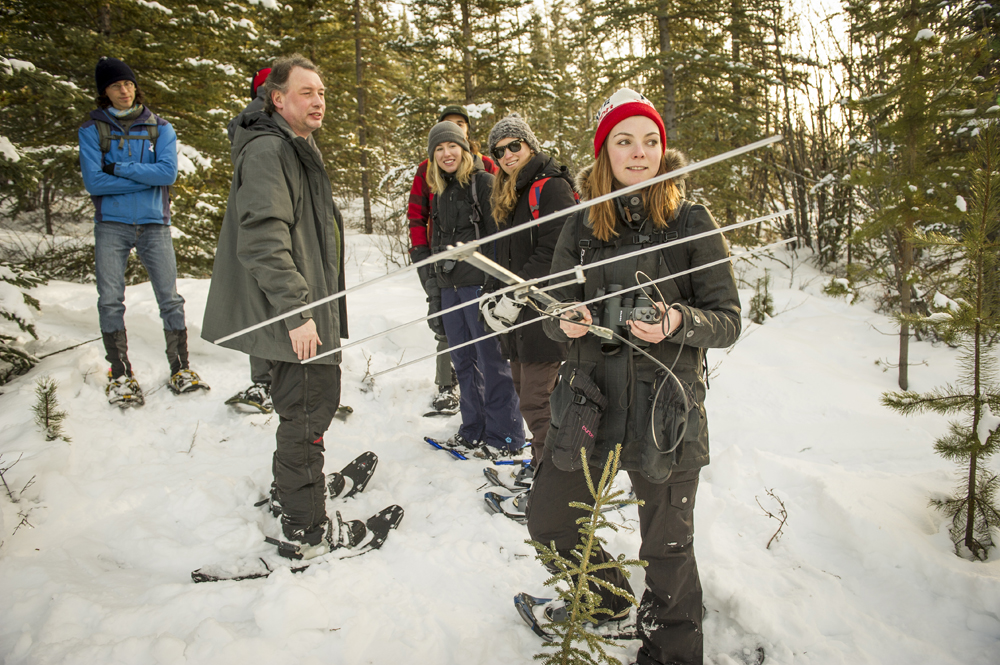Courses in the Northern Science program will be delivered this fall through a mix of methods. Most lab courses will have in-person lab sessions with lectures being delivered online with some mix of scheduled Zoom sessions and other online activities in Moodle, YukonU’s online learning platform. Courses without labs will be taught entirely online.
Online courses will require that you have access to your own computer and Internet connection.
More information about the online platforms that will be used for fall instruction can be found at www.yukonu.ca/student-life/technical-resources
Students new to online learning are encouraged to take the brief online introductory workshop Distance Learning Success. Contact the Academic Support Centre for more information:
www.yukonu.ca/student-life/learning-matters/academic-support-centre
The Northern Science diploma, ENCS stream, prepares students for transfer to the Bachelor of Science in Northern Environmental and Conservation Sciences (ENCS) program, offered at Yukon University in partnership with the University of Alberta. The diploma program provides two years of university transferable courses that fulfill the requirements to enter the third year of the ENCS program with a Major in Northern Systems.
The Diploma of Northern Science, ENCS stream, is awarded for the completion of the equivalent of 60 credits. Courses are selected from Core and Elective options, as well as two additional three-credit "free electives". These free electives can be chosen from a variety of disciplines (discuss with a Program Advisor).
To be eligible for admission, students must have completed a minimum of two of the following high school subjects, or equivalencies:
- English 12
- Biology 11
- Chemistry 11
- Precalculus 12 or Principles of Mathematics 12
Students who do not have all of the high school subjects or equivalencies listed above may be admitted to the Northern Science (ENCS Stream) program but will be required to complete upgrading for the subjects that they are missing. Upgrading courses are available through YukonU's School of Academic and Skill Development.
Yukon University recognizes that a greater understanding and awareness of Yukon First Nations history, culture and journey towards self-determination will help to build positive relationships among all Yukon citizens. As a result, you will be required to achieve core competency in knowledge of Yukon First Nations.
For details, visit Yukon First Nations Core Competency
After completing the Diploma of Northern Science, ENCS stream, students may apply to transfer into the third year of the Bachelor of Science in Northern Environmental and Conservation Sciences program (Northern Systems Major) offered by the University of Alberta at Yukon University.
Note: students must meet the entrance requirements of the University of Alberta, Faculty of Agricultural, Life, and Environmental Sciences, including a minimum Admission Grade Point Average (AGPA) of 2.3.
The Diploma of Northern Science, ENCS Stream, prepares students for studies in the Bachelor of Science in Northern Environmental and Conservation Sciences degree offered at Yukon University in partnership with the University of Alberta, or for transfer to B.Sc., professional, or technical programs at other institutions.
The program also presents an ideal continuing education opportunity and is useful for professionals seeking a northern specialization in their respective fields. Students who complete the Diploma of Northern Science, ENCS stream may pursue a variety of careers with federal, territorial, provincial or First Nation governments, as well as with non-profit organizations, consulting firms, and industry.
Examples of potential employment include:
- Fish and Wildlife Technician
- Lands and Resources Officer
- Park and Protected Area Planner
- Natural History or Heritage Interpreter
- Environmental Assessment Officer
Fees
Tuition for credit programs is calculated per course credit. See money matters for more information.
Some programs and courses have additional fees - see Ancillary Fees.
Student financial awards
Education is an investment in your future, your family and your community. Yukon University is pleased to support that investment by offering some of the most competitive tuition rates in the country, as well as several student financial awards to help offset your educational and living costs.
Financial assistance
There are government programs, scholarships, bursaries, awards and First Nation funding available to financially support you throughout your academic career.
See money matters for more information, or talk to our financial advising staff in the Student Services Centre. Email or call 867 668 5209 to make an appointment.
